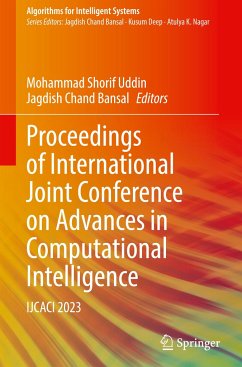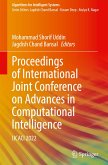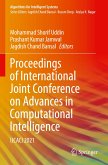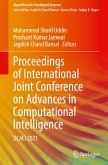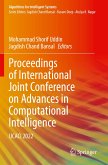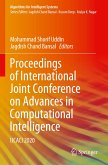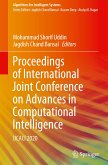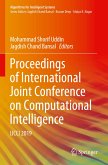Proceedings of International Joint Conference on Advances in Computational Intelligence
IJCACI 2023
Herausgegeben:Uddin, Mohammad Shorif; Bansal, Jagdish Chand
Proceedings of International Joint Conference on Advances in Computational Intelligence
IJCACI 2023
Herausgegeben:Uddin, Mohammad Shorif; Bansal, Jagdish Chand
- Gebundenes Buch
- Merkliste
- Auf die Merkliste
- Bewerten Bewerten
- Teilen
- Produkt teilen
- Produkterinnerung
- Produkterinnerung
This book gathers outstanding research papers presented at the 7th International Joint Conference on Advances in Computational Intelligence (IJCACI 2023), held in hybrid mode at South Asian University, New Delhi, India during October 14-15, 2023. IJCACI 2023 is jointly organized by Jahangirnagar University (JU), Bangladesh and South Asian University (SAU), India. The book presents the novel contributions in areas of computational intelligence and it serves as a reference material for advance research. The topics covered are collective intelligence, soft computing, optimization, cloud…mehr
Andere Kunden interessierten sich auch für
![Proceedings of International Joint Conference on Advances in Computational Intelligence Proceedings of International Joint Conference on Advances in Computational Intelligence]() Proceedings of International Joint Conference on Advances in Computational Intelligence231,99 €
Proceedings of International Joint Conference on Advances in Computational Intelligence231,99 €![Proceedings of International Joint Conference on Advances in Computational Intelligence Proceedings of International Joint Conference on Advances in Computational Intelligence]() Proceedings of International Joint Conference on Advances in Computational Intelligence216,99 €
Proceedings of International Joint Conference on Advances in Computational Intelligence216,99 €![Proceedings of International Joint Conference on Advances in Computational Intelligence Proceedings of International Joint Conference on Advances in Computational Intelligence]() Proceedings of International Joint Conference on Advances in Computational Intelligence216,99 €
Proceedings of International Joint Conference on Advances in Computational Intelligence216,99 €![Proceedings of International Joint Conference on Advances in Computational Intelligence Proceedings of International Joint Conference on Advances in Computational Intelligence]() Proceedings of International Joint Conference on Advances in Computational Intelligence232,99 €
Proceedings of International Joint Conference on Advances in Computational Intelligence232,99 €![Proceedings of International Joint Conference on Advances in Computational Intelligence Proceedings of International Joint Conference on Advances in Computational Intelligence]() Proceedings of International Joint Conference on Advances in Computational Intelligence154,99 €
Proceedings of International Joint Conference on Advances in Computational Intelligence154,99 €![Proceedings of International Joint Conference on Advances in Computational Intelligence Proceedings of International Joint Conference on Advances in Computational Intelligence]() Proceedings of International Joint Conference on Advances in Computational Intelligence154,99 €
Proceedings of International Joint Conference on Advances in Computational Intelligence154,99 €![Proceedings of International Joint Conference on Computational Intelligence Proceedings of International Joint Conference on Computational Intelligence]() Proceedings of International Joint Conference on Computational Intelligence154,99 €
Proceedings of International Joint Conference on Computational Intelligence154,99 €-
-
-
This book gathers outstanding research papers presented at the 7th International Joint Conference on Advances in Computational Intelligence (IJCACI 2023), held in hybrid mode at South Asian University, New Delhi, India during October 14-15, 2023. IJCACI 2023 is jointly organized by Jahangirnagar University (JU), Bangladesh and South Asian University (SAU), India. The book presents the novel contributions in areas of computational intelligence and it serves as a reference material for advance research. The topics covered are collective intelligence, soft computing, optimization, cloud computing, machine learning, intelligent software, robotics, data science, data security, big data analytics, and signal and natural language processing.
Produktdetails
- Produktdetails
- Algorithms for Intelligent Systems
- Verlag: Springer / Springer Nature Singapore / Springer, Berlin
- Artikelnr. des Verlages: 978-981-97-0179-7
- 2024
- Seitenzahl: 828
- Erscheinungstermin: 2. April 2024
- Englisch
- Abmessung: 241mm x 160mm x 47mm
- Gewicht: 1484g
- ISBN-13: 9789819701797
- ISBN-10: 9819701791
- Artikelnr.: 69692726
- Herstellerkennzeichnung Die Herstellerinformationen sind derzeit nicht verfügbar.
- Algorithms for Intelligent Systems
- Verlag: Springer / Springer Nature Singapore / Springer, Berlin
- Artikelnr. des Verlages: 978-981-97-0179-7
- 2024
- Seitenzahl: 828
- Erscheinungstermin: 2. April 2024
- Englisch
- Abmessung: 241mm x 160mm x 47mm
- Gewicht: 1484g
- ISBN-13: 9789819701797
- ISBN-10: 9819701791
- Artikelnr.: 69692726
- Herstellerkennzeichnung Die Herstellerinformationen sind derzeit nicht verfügbar.
Prof. Mohammad Shorif Uddin completed his Ph.D. in Information Science at Kyoto Institute of Technology in 2002, Japan, Master of Technology Education at Shiga University, Japan in 1999, Bachelor of Electrical and Electronic Engineering at Bangladesh University of Engineering and Technology (BUET) in 1991 and also Master of Business Administration (MBA) from Jahangirnagar University in 2013. He began his teaching career as Lecturer in 1991 at Chittagong University of Engineering and Technology (CUET). He joined the Computer Science and Engineering Department of Jahangirnagar University, and at present, he is Professor of this department. He served as Chairman of the Computer Science and Engineering Department of Jahangirnagar University from June 2014 to June 2017 and Teacher-in-Charge of the ICT Cell of Jahangirnagar University from February 2015 to December 2022. He holds two patents for his scientific inventions and has published around 200 research papers in international journals and conference proceedings. Dr. Jagdish Chand Bansal is Associate Professor (Senior Grade) at South Asian University New Delhi and Visiting Faculty at Maths and Computer Science, Liverpool Hope University UK. He also holds visiting professorship at NIT Goa, India. He obtained his Ph.D. in Mathematics from IIT Roorkee. His primary area of interest is Swarm Intelligence and Nature Inspired Optimization Techniques. Recently, he proposed a fission-fusion social structure-based optimization algorithm, Spider Monkey Optimization (SMO), which is being applied to various problems in the engineering domain. He has published over 70 research papers in various international journals/conferences. He is Section Editor (Editor-in-Chief) of the journal MethodsX published by Elsevier. He is also Associate Editor of Engineering Applications of Artificial Intelligence (EAAI) and ARRAY published by Elsevier. He is General Secretary of the Soft Computing Research Society (SCRS). He has also received Gold Medal at UG and PG levels.
Conversational Swarm Intelligence (CSI) enhances groupwise deliberation.- Enhancing Biometrics with Auto Encoder: Accurate Finger Detection from Fingerprint Images.- Minimization of Structural Systems Eccentricity by means of the Imperialist Competitive Algorithm.- Towards Early Detection of Neonatal Birth Asphyxia Utilizing Ensemble Machine Learning Approach.- Data Hiding System based on variations in Image Interplation algorithms.- Fault assessment and early performance prediction of PV module using machine learning.- Speeding classification by a deep learning audio analysis system optimized by the reptile search algorithm.- Exploring Sentiments in Text: A Survey of Implicit and Explicit Aspect-Based Sentiment Analysis.- A Comprehensive Review on Prediction of Blood Glucose Level in Type-1 Diabetic Using Machine Learning Techniques.- Effect of Phosphorylation on the Circadian Clock of Drosophila by Analytical and Graph Theory Matrix Approach.- Exploiting Deep Learning Techniques for Autistic Face Recognition.- A Comprehensive Review of Migration of Big Data Applications to Public Clouds: Current Requirements, Types, Strategies and Case Studies.- Potato Leaf Disease Detection and Classification Using VGG16.- Assessing Student Engagement Levels Using Speech Emotion Recognition.- K-means Clustering and Support Vector Machine for Assamese Dialect Identification.- Emotion recognition in speech using Convolutional Neural Networks (CNNs).- Single Value Neutrosophic Virtual Machine Resources Optimization Route Selection in Multimodal Transport Networks Incorporating Disruption.- A Smart Surveillance System to detect modern gun using YOLOv5 algorithm: A Deep Learning Approach.- A Comparative Analysis of models for Dark Web Data Classification.
Conversational Swarm Intelligence (CSI) enhances groupwise deliberation.- Enhancing Biometrics with Auto Encoder: Accurate Finger Detection from Fingerprint Images.- Minimization of Structural Systems Eccentricity by means of the Imperialist Competitive Algorithm.- Towards Early Detection of Neonatal Birth Asphyxia Utilizing Ensemble Machine Learning Approach.- Data Hiding System based on variations in Image Interplation algorithms.- Fault assessment and early performance prediction of PV module using machine learning.- Speeding classification by a deep learning audio analysis system optimized by the reptile search algorithm.- Exploring Sentiments in Text: A Survey of Implicit and Explicit Aspect-Based Sentiment Analysis.- A Comprehensive Review on Prediction of Blood Glucose Level in Type-1 Diabetic Using Machine Learning Techniques.- Effect of Phosphorylation on the Circadian Clock of Drosophila by Analytical and Graph Theory Matrix Approach.- Exploiting Deep Learning Techniques for Autistic Face Recognition.- A Comprehensive Review of Migration of Big Data Applications to Public Clouds: Current Requirements, Types, Strategies and Case Studies.- Potato Leaf Disease Detection and Classification Using VGG16.- Assessing Student Engagement Levels Using Speech Emotion Recognition.- K-means Clustering and Support Vector Machine for Assamese Dialect Identification.- Emotion recognition in speech using Convolutional Neural Networks (CNNs).- Single Value Neutrosophic Virtual Machine Resources Optimization Route Selection in Multimodal Transport Networks Incorporating Disruption.- A Smart Surveillance System to detect modern gun using YOLOv5 algorithm: A Deep Learning Approach.- A Comparative Analysis of models for Dark Web Data Classification.

